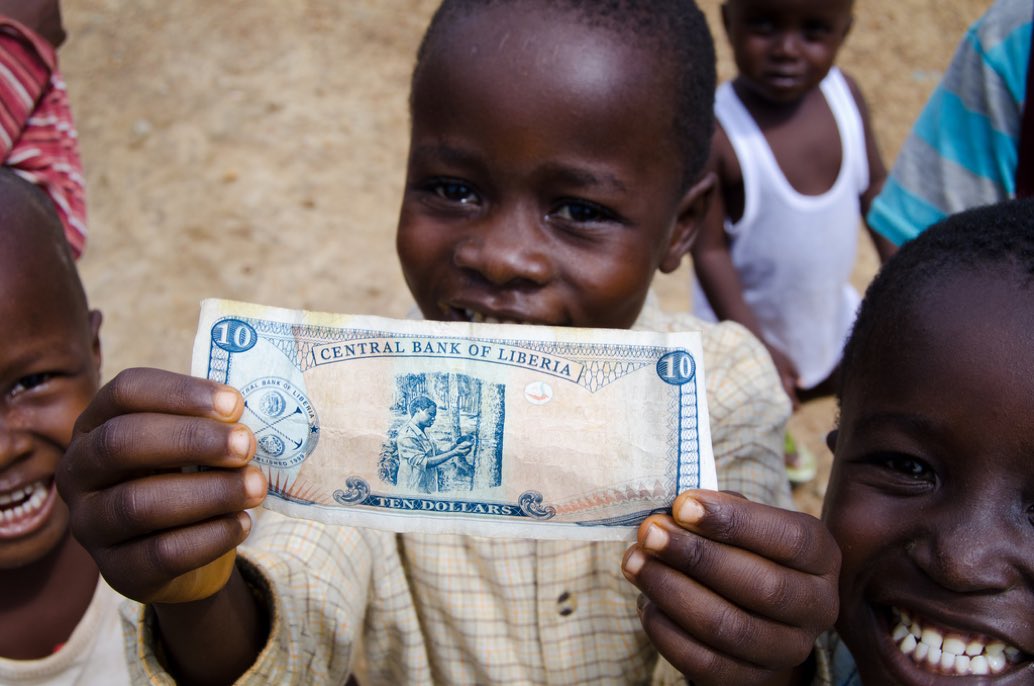The Liberian Revenue Authority, under instruction from President George Weah, recently announced a new tariff schedule, reducing the tariffs charged on imported goods by varying percentages, especially food items.
According to an Executive Mansion statement, the tariff reduction is intended to help reduce the prices of basic commodities. While this is a laudable effort, it may not serve its intended purpose if urgent fiscal attention is not given to the underlying cause of the rise in the prices of basic commodities on the Liberian market – trade and budget deficits.
The Liberian economy has weakened since the Ebola epidemic began in 2014. After posting growth rates as high as eight percent in 2013, the economy experienced a nose dive, reaching negative five percent in 2016.
The economy has since gone into recovery, but the recovery has been weak due largely to slumps in earnings from Liberia’s exports. For instance, in 2017, according to the Central Bank of Liberia, Liberia earned US$388.8 million from its total exports, a 39-percent increase from US$279.3 million in 2016.
This improvement was largely due to an increase in earnings from the exports of iron ore and rubber. It has not, however, been adequate to offset the effect in the decline in earnings in 2014-2017 from iron ore and rubber, Liberia’s major exports. Meanwhile, Liberia’s demand for imports remains high, driven by the increase in demand for rice and petroleum products.
While a drop when compared with that of 2014 (US$1,816.7 million), this level of demand for imported commodities has resulted in an unfavorable balance of trade between Liberia and the rest of the world. According to the Central Bank, Liberia’s trade deficit has been between US$1,513 million and US$629.3 million between 2014 and 2017, respectively.
The effect of this deficit has shown up in the acute shortage of foreign exchange (the U.S. dollar), the rise in domestic prices for basic commodities, and government’s budget deficit.
This soaring demand amid limited stabilization interventions, along with the departure of UNMIL, has increased the pressure on the price of the U.S. on the Liberian foreign exchange market, steadily decreasing the purchasing power of the Liberian dollar.
The exchange reporting posted by the Central Bank shows an eight percent drop in the value of the Liberian dollar relative to the U.S. dollar between April and May 2018. When compared to December 2014, the Liberian dollar has depreciated against the U.S. dollar by about 68 percent from the exchange rate of L$82.61/US$1.00.
This loss of value by the Liberian dollar has resulted in the increase in the prices of basic commodities. With no increase in real income, it has left consumers, especially the low income households, economically worse off. This bracket constitutes the majority of the population of Liberia. For these households, the demand for food, especially rice, which is a necessity, is inelastic.
The effect of an increase in price without increase in income may therefore cause these households to either reduce rice consumption or investment in healthcare or children’s education. These actions have consequences for the food security position of households or the country’s long term human capital prospects.
The foregoing suggests that while the government’s latest tariff intervention should be lauded, it demands forward-thinking, out-of-the-box interventions that improve the economic welfare of the targeted beneficiary, the country’s poor. These interventions include growing, diversifying, and strengthening the economy against its reliance on primary exports alone. Economic diversification seems to be a long-term goal.
However, in the immediate term, focus should be given to investment in sectors that have the greatest potential to reduce the trade deficits, while expanding and improving Liberian entrepreneurship. This could expand income at both the household and the national levels.
While growth is necessary, growth itself alone is insufficient for improving the economic welfare of Liberia’s poor. Liberia has a history of growth, but the dividends of that growth have been skewed in favor of the elite class and non-inclusive of the majority population. Due to the nature of past Liberian governments, economic growth has not increased economic opportunities or improved the economic welfare of Liberia’s poor.
Between 1965 and 1980, more than 60 percent of Liberia’s total income benefitted the top five percent, a condition that led to the civil war, according to George Klay Kieh’s The First Liberian Civil War: A Crisis of Underdevelopment. While this gap seems to have narrowed, it hasn’t changed significantly: recent World Bank data shows that more than 40 percent of Liberia’s total income has benefited the country’s top 20 percent.
Addressing the current economic plight of Liberia’s poor therefore requires a serious effort at transforming the nature and character of governance in Liberia from one that is extractive to one that is inclusive. Inclusive governance fosters the equality of political and economic opportunities for the population, while extractive governance skews economic opportunities in favor of the governing elites and their associates.
The current regime has articulated very strongly that its approach to the country’s economic crisis will be anchored on a pro-poor growth development strategy. A pro-poor growth development strategy enables the poor and other traditionally excluded groups, such as women, to benefit more proportionally from economic growth than the non-poor.
A pro-poor growth development strategy is differentiated from trickle-down economics by its primary concern on increasing the economic welfare of the poor through productive employment. Thus, the benefits of economic growth must not trickle from the top to the bottom of the economic ladder.
Instead, it must increase economic opportunities for the poor through an efficient use of their labor in productive employment. Productive employment generates increased income for those employed and higher returns or investment for the self-employed and contributes to improved living standards of the population. Productive employment is therefore the primary determinant for a growth that is pro-poor, sustainable, and inclusive.
Achieving pro-poor growth, therefore, requires institutional and policy reforms that not only increase the economic welfare of the poor, but also remove policy-induced bias that empowers one group to extract the dividends of growth through functional distribution. Public policies that contribute to pro-poor growth include investment in human and physical capital, sound macroeconomic management that emphasizes financial accountability, fiscal prudence, and transparency, and the promotion of small and medium enterprises.
The details of current regime’s pro-poor growth development strategy are not yet known; however, the government has announced the following as the pillars upon which its development strategy will be anchored: education and training; economy, jobs and infrastructure development; and sustainable peace, security, and national defense.
It is important that the yet-to-be released strategy must identify clearly measurable baselines, targets, deliverables or indicators for monitoring and tracking the means through which the strategy would improve the economic welfare or address the anxiety and expectations of the population.
Along this line, the strategy must establish a system of monitoring and evaluation that links its deliverables with the overall national goal of sustainable economic development. Also vital is the establishment of an implementation coordination mechanism that would ensure that the implementation of this development strategy is not done through the operations of “project enclaves,†or sectoral cleavages among government agencies and donors.
Despite these, the yet-to-be released strategy will not lead to inclusive economic development if the nature, character, and operations of government institutions focus only on policies and actions that increase economic growth and not improve the economic welfare of Liberia’s poor. Inclusive economic development policies are not judged by the rates of economic growth alone.
They are judged by the quality of growth and the kind of mechanisms created by state institutions to distribute the dividends of economic growth. These mechanisms should create opportunities that improve the economic welfare of the poor and increase their capacity to participate in and enjoy fully the benefits of economic growth, while ensuring that the dividends of growth reach the most vulnerable of society.
Pro-poor growth is more than market liberalization. While market liberalization provides the incentive for exchange, specialization and economic prosperity, the operation of a liberalized market is a function of the existing political and economic behavior of government. Thus, markets operating within an environment of inclusive development are not just free markets.
The role of government should extend, therefore, beyond the provision of monetary handouts to prioritizing public actions that are likely to have the greatest positive effect on the economic welfare of the poor; these actions include properly targeted investments in the provision of quality education, improved and accessible health care, clean drinking water and sanitation, and inputs for improved agriculture productivity, rural livelihoods and development. Improving agriculture productivity will require a keen focus on market access and the financial exclusion of rural farmers – key constraints to agriculture productivity.
The exploitation of natural resources should be done transparently, efficiently, and sustainably. Communities in which these exploitations will be conducted should have a major say in the decision concerning the awards of and the utilization of revenues from the resource exploitation.
Fiscal policies should be consistent, efficient, and sustainable. Towards this end, budgetary allocations must be fair and aligned with the targets of the yet-to-be-released agenda and free of populist influence. Allocations should be targeted at interventions that are specific, measurable, easy-to-implement and monitor, and can deliver the value for money.
This demands an end to inefficient public expenditures, bureaucratic inefficiencies, corruption, and the disregard for financial accountability which privilege one group over another in the distribution of the national wealth. Doing so requires the government to destroy the incentive structure for the use of public institutions as the medium for one group to extract the national wealth from the rest of the population.
The issue of physical infrastructure targeted at groups previously excluded from the national wealth is vital to pro-poor growth. Such investment would be inefficient, however, if they explode the national debt beyond sustainable levels, are cost-intensive, difficult to implement, or unsustainable in the long-term. Undertaking such projects could increase the tax burden on the poor, reducing their long-run income, and therefore should be prevented.
These suggested policy actions do not represent a magic bullet to Liberia’s current economic development challenges. They represent, however, some of the critical areas of governance that need reorientation as the country pursues actions to improve the economic welfare of the majority of its population, the poor. Development planning or strategy development is vital to governance, but plans or strategies do not bleed, people do! And only a development plan or strategy that is inclusive and the orientation of its implementation is itself pro-people and inclusive can prevent this bleeding, such as that being produced by the rising hardship on the poor.
Featured photo by Cameron Zohoori/Together Liberia



